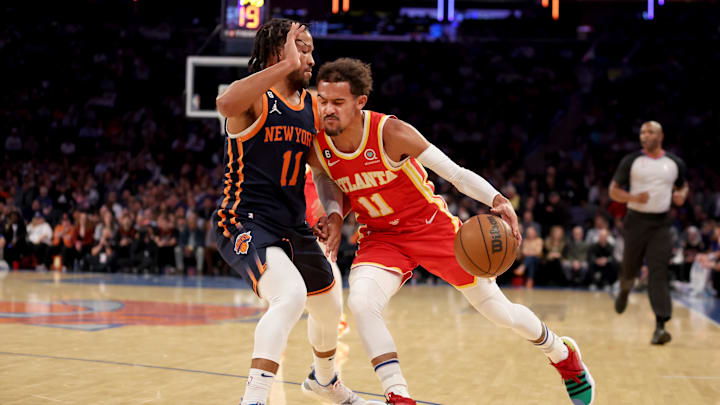One of the big stories of the 2025 offseason for the Atlanta Hawks is the future of Trae Young. The four-time All-Star guard is heading into his age-27 season after comfortably leading the NBA in assists in 2024-25, and Young has been the franchise player for the Hawks since arriving in 2018. However, Young is also up for a potential contract extension, and the 2025-26 campaign is the final season in which Young is firmly under team control.
As such, opinions are flying on whether the Hawks should consider trading Young, though the most recent public intel points to Atlanta being more likely to keep the Oklahoma product long-term. The "will they or won't they?" dance in the trade market is only one factor, though, as extension negotiations could be somewhat tricky between Young and the Hawks. One reason is simply the size of the extension he is eligible to sign.
Without making All-NBA in 2024-25 (still to be determined), Young could sign for four years and more than $220 million. That would put Young in the $60 million range by the end of a four-year pact and, while he is clearly worth a "max" contract at present, the jury is out on whether Young, a small guard, can maintain that pace through his age-31 season. At the same time, Young would be justified in seeking the most money he can, and that conundrum means the two sides are potentially in for a negotiation that is a lot more complicated than the max extension Young inked after his third season.
What the Knicks can show the Hawks
One potential avenue from a team-building standpoint is for the Hawks to convince Young to sign long-term at a figure below his max rate. Conveniently, a player in a very similar neighborhood among NBA stars recently agreed to a deal that could be a template, and that is New York Knicks guard Jalen Brunson. To be clear, Young and Brunson were not in identical situations. For one, Brunson was not a top-five pick in the NBA Draft, and he landed in New York originally because his incumbent team, the Dallas Mavericks, failed to extend him. Without diving into every intricacy, the situations are at least similar, however, and both players were selected in the same 2018 NBA Draft.
Long story short, Brunson could have waited a year and agreed to a (much) larger extension with the Knicks. Instead, he agreed to a deal last summer, knowingly taking less money in part to allow New York to make the moves that landed Mikal Bridges in a trade and re-upped OG Anunoby on a massive free agent deal. Ultimately, Brunson signed a four-year deal, including a player option in the final year, worth approximately $156.5 million. That is considerable money, of course, but it is also a relative bargain for an All-Star player, as Brunson is set to make less than 23 percent of the salary cap in each of the four seasons.
The Knicks still have one massive salary (Karl-Anthony Towns) on their books at nearly $50 million this season, but the rest of the roster mirrors what Atlanta's books could look like. Anunoby is signed for big money, but he will make less than $40 million in 2025-26. Brunson, Bridges, Josh Hart, and Mitchell Robinson are on eight-figure salaries, but it is at least reasonable to extrapolate where they stand as a template for the Hawks around players like Dyson Daniels (up for an extension this summer) and Onyeka Okongwu, plus Zaccharie Risacher is a core piece under a rookie-scale deal for three more seasons.
A key difference
It is worth emphasizing that what Brunson did in taking (far) less money than he could've reasonably received is not the norm. It does happen, but it probably shouldn't be the expectation for Young. There are also other nuances involved. There is a big gap between what Brunson signed for at less than $40 million AAV and what Young's max is at approximately $55 million AAV. That could allow for manueverability on either side.
But the other key factor is that, simply put, the Knicks probably have more overall spending power than the Hawks do. For example, New York is well over $10 million into the luxury tax in 2024-25, even before Brunson's extension kicks in for the 2025-26 season. Atlanta has not paid the luxury tax in well over a decade, which covers the entirety of Tony Ressler's ownership. That could change, of course, but the Hawks probably aren't going to spend deep into the first apron as the Knicks have been prepared to do, leaving Atlanta with more operational constraints.
Overall, the parallels are clearly there. The Knicks are built around a star guard who is small but dynamic, just as the Hawks are. New York surrounds him with two-way wings and forwards in Anunoby, Bridges, and Hart, just as Atlanta is attempting to do with Daniels, Risacher, and Johnson. None of that ensures that the Hawks can secure Trae Young to a below-market extension in the way that the Knicks did with Brunson, especially since there aren't the collegiate connections that seemed to foster Brunson's willingness to take less and pave the way for Bridges.
Still, it's an interesting team building model for the Hawks to look at, and it could start with a very interesting set of contract negotiations involving the team's centerpiece this summer.
